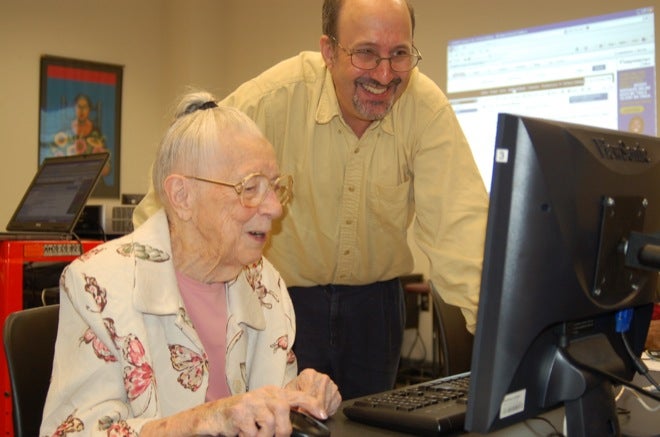Open source enthusiasts firmly believe that much is possible when people band together. After all, the core underpinning of open source doctrine is social. So I recently decided it's time that teachers band together to specify the computers we want manufacturers to make. Open source thinking gives me the boldness to think this is possible.
I explain my ideas briefly in the following YouTube video:
If you feel further moved to action, write a blog post or create a YouTube video sharing your ideas on this topic. Use the Twitter hashtag #20000teachers to tell the world (and me) about your blog post or YouTube video. I'll link to some of these from the official website.
My threshold for linking is fairly low. If you've got something constructive to say, in a coherent manner, I'll be linking to your ideas.

Phil Shapiro shows Dottie Brown, 97, how to play TetraVex
Yes, if 20,000 teachers assemble, the next step may be a crowdfunding campaign of some sort. The computer manufacturing business is very competitive. Computer manufacturers could not ignore the wishes of an organized large group, especially if a sizable bounty were offered to the manufacturer who is most responsive to our specified wishes. A sizable bounty becomes ever more feasible the larger the number of people assembled.
Lastly, the annoying expense of computer purchase shipping costs can be dramatically reduced if very lightweight computers were sold in packages of 5 or 10-as a group purchase-for delivery to a school, college, library, nonprofit organization, etc. This would save fuel costs in shipping, too. Wouldn't it be a relief to pay $2 in shipping costs for a computer, rather than $10 or $20?
If these ideas resonate, join this low-volume announcements-only Yahoo! group and spread the word to other teachers, librarians and community organizers. Step right up and be counted. There is always strength in numbers.
Note: this is a teachers-focused initiative, but the computers being manufactured for the needs of teachers would also be for sale to the general public. And homeschooling parents are very much welcomed, as are school counselors, social workers, principals, assistant principals, superintendents, and other school support staff. All higher education educators are included, too. If you're a non-educator penguin, waddle onto this Yahoo! group, too.
This particular project is not affiliated with Phil's employer, MAKE magazine, or Opensource.com.







5 Comments